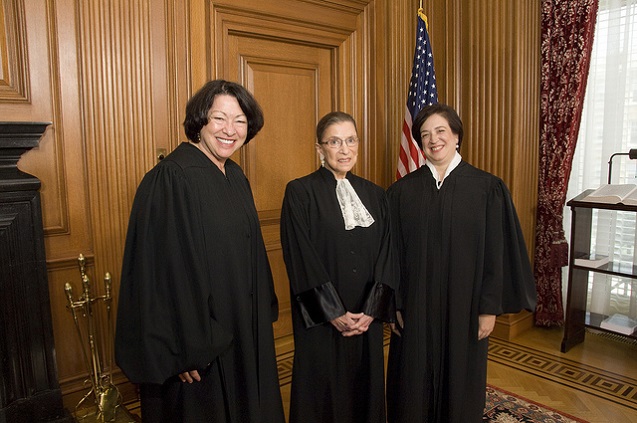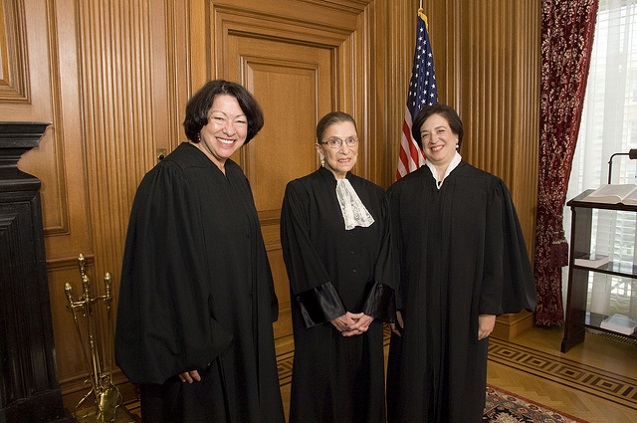
Part of the Series
Moyers and Company
Honest, paywall-free news is rare. Please support our boldly independent journalism with a donation of any size.
 : Steve Petteway, Collection of the Supreme Court of the United States / Flickr)” width=”637″ height=”423″ />Three sitting female Justices: Justices Sonia Sotomayor (left) and Ruth Bader Ginsburg (center) with Justice Elena Kagan in the Justices’ Conference Room prior to Justice Kagan’s Investiture Ceremony. (Photo: Steve Petteway, Collection of the Supreme Court of the United States / Flickr)
: Steve Petteway, Collection of the Supreme Court of the United States / Flickr)” width=”637″ height=”423″ />Three sitting female Justices: Justices Sonia Sotomayor (left) and Ruth Bader Ginsburg (center) with Justice Elena Kagan in the Justices’ Conference Room prior to Justice Kagan’s Investiture Ceremony. (Photo: Steve Petteway, Collection of the Supreme Court of the United States / Flickr)
Supreme Court rulings on gay rights are progressively pushing forward, while decisions related to women’s equality are moving in the opposite direction, Justice Ruth Bader Ginsburg says.
Last week, Ginsburg told an audience at Duke University that on gays rights, the court speaks of “equal dignity,” but for women, the court has yet to embrace “the ability of women to decide for themselves with what their destiny will be.”
In her blistering dissent on the recent Hobby Lobby decision – which allowed some employers to refuse to pay for insurance coverage for contraception on religious grounds – Ginsburg said the court “had ventured into a minefield.”
“The decision could lead to job discrimination against women. What of the employer whose religious faith teaches that it’s sinful to employ a single woman without her father’s consent or a married woman without her husband’s consent?” she asked. Ginsburg said the court’s five-justice male majority did not understand the challenges women face in achieving real equality.
It’s comments such as these that have contributed to an outpouring of adoration by young women and progressives for Ginsburg who have nicknamed her Notorious RBG, with a Tumblr dedicated to the justice.
“Most of it I think is very funny. There is a rap song, and there is one using the words from the Hobby Lobby dissent. I haven’t seen anything that isn’t either pleasing or funny on the website,” Ginsburg told Katie Couric in an interview.
Justice Ginsburg is not alone in observing that the court sees rights for women and rights for gay people differently, as Adam Liptak wrote this week in The New York Times. So why the disconnect?
Gay men and lesbians still have a long way to go before they achieve the formal legal equality that women have long enjoyed. But they have made stunning progress at the Supreme Court over the last decade, gaining legal protection for sexual intimacy and unconventional families with stirring language unimaginable a generation ago.
At the same time, legal scholars say, the court has delivered blows to women’s groups in cases involving equal pay, medical leave, abortion and contraception, culminating in a furious dissent last month from the court’s three female members.
Many forces are contributing to this divide, but the most powerful is the role of Justice Anthony M. Kennedy, the court’s swing vote. Legal scholars say his jurisprudence is marked by both libertarian and paternalistic impulses, ones that have bolstered gay rights and dealt setbacks to women’s groups.
A Sacramento lawyer and lobbyist who still lived in the house he grew up in when President Ronald Reagan nominated him to the Supreme Court in 1987, Justice Kennedy is the product of a placid middle-class existence in which most women stayed within traditional roles. Some of his judicial writing, Justice Ginsburg once wrote in dissent, reflected “ancient notions about women’s place in the family.”
But Justice Kennedy, 78, has long had gay friends, and his legal philosophy is characterized by an expansive commitment to individual liberty.
Read the full article at The New York Times.
A terrifying moment. We appeal for your support.
In the last weeks, we have witnessed an authoritarian assault on communities in Minnesota and across the nation.
The need for truthful, grassroots reporting is urgent at this cataclysmic historical moment. Yet, Trump-aligned billionaires and other allies have taken over many legacy media outlets — the culmination of a decades-long campaign to place control of the narrative into the hands of the political right.
We refuse to let Trump’s blatant propaganda machine go unchecked. Untethered to corporate ownership or advertisers, Truthout remains fearless in our reporting and our determination to use journalism as a tool for justice.
But we need your help just to fund our basic expenses. Over 80 percent of Truthout’s funding comes from small individual donations from our community of readers, and over a third of our total budget is supported by recurring monthly donors.
Truthout has launched a fundraiser to add 379 new monthly donors in the next 6 days. Whether you can make a small monthly donation or a larger one-time gift, Truthout only works with your support.